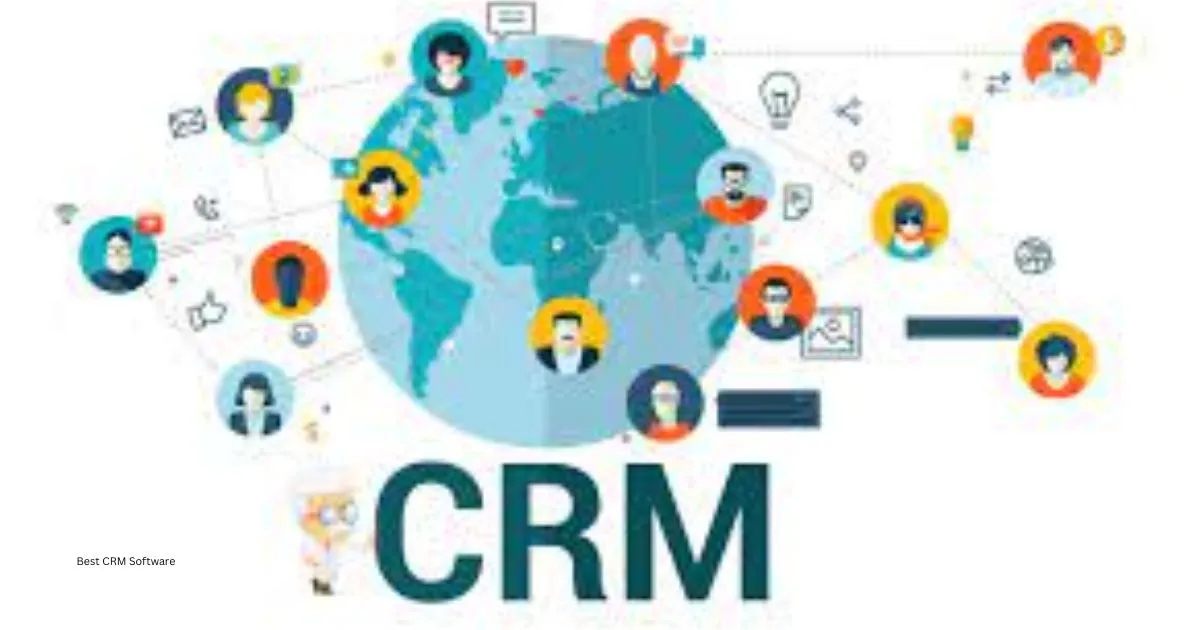Best CRM Software

Basic Definition
CRM software, or customer relationship management software, is designed to help businesses manage interactions with customers. It stores valuable information like contact details, sales history, and support issues. This software acts as a digital assistant that keeps all communication organized. It’s widely used to improve business relationships and customer service. Without CRM, important details often get lost or forgotten.
Core Purpose in Business
The main purpose of CRM is to enhance customer satisfaction and loyalty. It centralizes customer data, helping teams stay updated and aligned. With a CRM system, businesses can personalize interactions and track customer journeys. It simplifies communication between departments. Ultimately, CRM boosts sales and long-term customer engagement.
Why You Need the Best CRM Software
Centralized Customer Data
A CRM stores all client data in one place, making it easy to find and update. You don’t have to switch between spreadsheets or notebooks. It ensures everyone in your team is on the same page. This helps reduce miscommunication and errors. It also builds customer trust through organized and consistent communication.
Improved Sales and Marketing Alignment
CRM bridges the gap between your marketing and sales teams. Marketing can generate leads, and sales can track and close them efficiently. Both departments can share performance data in real time. This alignment increases conversion rates and revenue. CRM ensures efforts aren’t duplicated or missed.
Streamlined Communication
CRM allows teams to see previous emails, calls, and notes with customers. This means you don’t repeat questions or forget what was discussed. Auto-reminders ensure no lead is neglected. It promotes timely and professional responses. This keeps customers feeling valued and understood.
Top Features to Look for in a CRM System
Contact Management
Contact management lets you store all customer details like name, email, and interactions. You can categorize leads, clients, or past customers easily. It supports fast searches and updates. Contact records help with better follow-ups. A well-organized contact list boosts customer satisfaction.
Sales Pipeline Tracking
With pipeline tracking, you can visualize each deal’s stage. You’ll know which prospects need attention and which are close to closing. This helps prioritize work and manage sales goals better. It brings structure to the sales process. It also shows where bottlenecks occur.
Marketing Automation
CRM systems automate repetitive marketing tasks like email campaigns and follow-ups. You can schedule messages and segment customers easily. Automation helps nurture leads more efficiently. It saves time while increasing engagement. It also ensures consistency in outreach.
Reporting and Analytics
CRMs offer detailed reports on sales, performance, and customer activity. This helps businesses make data-driven decisions. Visual dashboards simplify metrics for quick understanding. Reports show what’s working and what needs change. Analytics helps track ROI and plan future campaigns.
Integration with Other Tools
The best CRMs connect with tools like Gmail, Outlook, Zoom, and Slack. This saves time switching between platforms. Integration enhances productivity by syncing data. It makes team collaboration smoother. It also reduces manual entry errors.
Best CRM Software in 2025 (Reviewed & Compared)
1. Salesforce
Salesforce is a leader in CRM and suits large businesses. It offers powerful customization and analytics tools. Its AI feature, Einstein, helps with predictions and insights. Salesforce is best for companies needing detailed workflows. However, it’s more expensive than others.
2. HubSpot CRM
HubSpot is great for small businesses and startups. It offers a generous free version with optional upgrades. The platform is user-friendly and quick to set up. It supports marketing, sales, and customer service functions. As your business grows, you can scale easily.
3. Zoho CRM
Zoho is known for being budget-friendly yet feature-rich. It suits SMBs that need flexibility without spending too much. Zoho integrates with many tools and includes mobile access. It offers AI support and workflow automation. The interface may feel slightly outdated to some users.
4. Monday Sales CRM
Monday CRM is visual and easy to use, ideal for teams who like kanban boards. It simplifies project-based selling and collaboration. You can create custom workflows and dashboards. It helps sales teams track tasks visually. It’s best for teams that value visual planning.
5. Pipedrive
Pipedrive is built with salespeople in mind. It offers a clean interface and pipeline tracking. Automation features reduce manual work. It’s best for small teams that want to focus on closing deals. Reporting tools are basic unless you upgrade.
6. Freshsales by Freshworks
Freshsales is great for businesses on a budget. It includes built-in calling, email, and lead scoring tools. AI helps you focus on hot leads. It’s easy to use and offers a free plan. It’s growing fast in popularity for its simple, all-in-one design.
📋 Comparison Table of Best CRM Software
| CRM | Ideal For | Starting Price | Free Plan | Key Strength |
|---|---|---|---|---|
| Salesforce | Enterprises | $25/user/month | No | Deep customization |
| HubSpot | Small businesses | $0 | Yes | Marketing automation |
| Zoho CRM | Budget-conscious SMBs | $14/user/month | Yes | Affordable customization |
| Monday CRM | Visual sales tracking | $10/user/month | Yes | Project-style UI |
| Pipedrive | Sales-focused teams | $14.90/month | No | Simple pipeline views |
| Freshsales | Growing startups | $0 | Yes | Built-in communication |
Industry-Specific CRM Tools
CRM for Real Estate
CRMs like LionDesk offer property tracking and lead follow-ups. Agents can schedule viewings and email clients easily. Auto-texting and email reminders help maintain contact. It keeps clients informed throughout their buying journey. It also organizes documents like listings and offers.
CRM for E-Commerce
E-commerce CRMs connect with platforms like Shopify or WooCommerce. They help track cart abandonment and retarget customers. Marketing automation boosts repeat sales. CRM insights show top buyers and product preferences. This helps with upselling and inventory planning.
CRM for Healthcare
Healthcare CRMs are HIPAA-compliant and secure. They help clinics manage patient records and appointments. Personalized communication improves patient engagement. CRM software like Salesforce Health Cloud offers real-time care plans. It enhances follow-up scheduling and reduces no-shows.
Cloud-Based vs. On-Premise CRM
Pros and Cons of Cloud-Based CRM
Cloud CRM works via the internet and doesn’t need installation. It updates automatically and is cost-effective upfront. Data is stored remotely, so access is easy from anywhere. However, it depends on internet availability. Subscription costs may add up over time.
Pros and Cons of On-Premise CRM
On-premise CRM is installed on company servers. It offers more control over data and security. It’s a good choice for businesses with strict compliance needs. However, setup and maintenance require IT support. It also involves a higher upfront investment.
How to Choose the Best CRM for Your Business
Size of Your Business
Small businesses need easy-to-use and affordable CRMs. Larger companies might need advanced features and custom workflows. Consider how many users need access. Your CRM should grow with your team. Choose what matches your current and future needs.
Budget Constraints
Startups can begin with free or low-cost tools like HubSpot or Freshsales. Premium features come with higher pricing. Be careful of hidden costs like add-ons. Invest based on return potential, not just cost. Always use free trials before purchasing.
Ease of Use and Learning Curve
CRMs with clean interfaces reduce training time. Tools like Monday and Pipedrive are very intuitive. Complicated systems may slow your team down. Always check for user guides and support. A smooth learning curve means quicker returns.
Common CRM Mistakes to Avoid
Don’t rush into choosing a CRM without understanding your needs. Avoid overcomplicating with too many features you won’t use. Not training your team properly can lead to failure. Ignoring updates and data hygiene creates confusion. Set clear goals before CRM implementation.
Benefits of Implementing the Best CRM Software
CRM helps you keep every lead organized and followed up. It improves team collaboration and communication. Businesses see more sales, happier customers, and faster growth. It also allows better reporting and planning. In short, it turns chaos into clarity.
Final Thoughts
Choosing the best CRM software depends on your business type, size, and budget. Whether you need simplicity or advanced automation, there’s a solution out there. The right CRM can be a total game-changer for your operations. Make your decision based on value, not just popularity. Test your top options before committing fully.
FAQs
What’s the best free CRM right now?
HubSpot is considered the best free CRM with powerful features and upgrade options.
Can CRM improve customer service?
Yes, CRM helps track every interaction, ensuring personalized and faster support.
Are CRMs only for large companies?
No, small businesses benefit from CRMs by organizing contacts and automating tasks.
What’s better: cloud CRM or on-premise CRM?
Cloud CRMs are more flexible and easier to maintain, especially for small teams.
How quickly can I implement CRM software?
Most cloud-based CRMs can be set up in a few hours to a few days depending on complexity.






